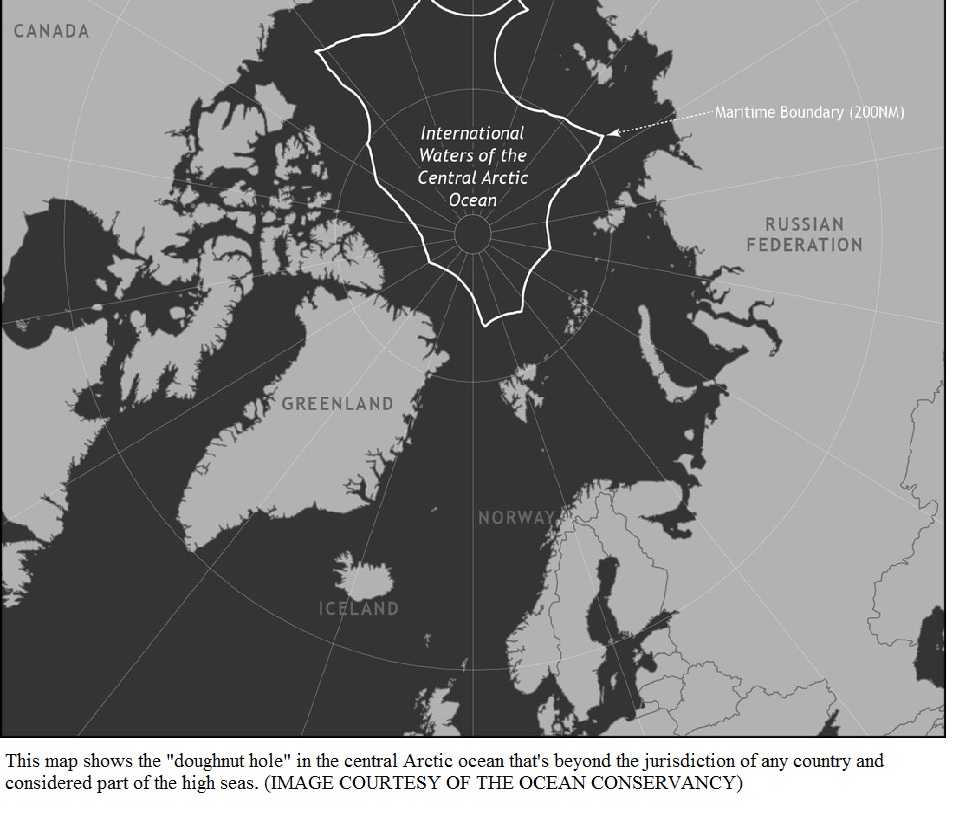December 1, 2017
Ten countries struck a tentative pact yesterday to forbid commercial fishing in the central Arctic Ocean for at least the next 16 years, while scientists try to understand the size and health of the region’s fish stocks. The draft agreement, reached on Thursday, Nov. 30, will become legally binding once it is signed. It’s being celebrated as an example of offering precautionary protections to fish stocks before they’ve become depleted. “The fish that are there are obviously of value to the ecosystem,” said Trevor Taylor, vice president of conservation for Oceans North, who is based in Iqaluit and who helped push for the deal over the last seven years.
 “They’re the fish that seals eat. Seals are what polar bears eat. All of it is connected. Arctic cod is the underpinning of the entire marine mammal Arctic food web. If you start destabilizing the food supply, then undoubtedly you’ll destabilize the populations of seals and polar bears and whales that Canadian Arctic Inuit communities depend on.
“They’re the fish that seals eat. Seals are what polar bears eat. All of it is connected. Arctic cod is the underpinning of the entire marine mammal Arctic food web. If you start destabilizing the food supply, then undoubtedly you’ll destabilize the populations of seals and polar bears and whales that Canadian Arctic Inuit communities depend on.
“That’s why it’s important for Canada, and that’s why it’s important for Inuit.”
There’s currently no known commercial fishing in the central Arctic Ocean, which covers about 2.8 million square kilometres across the top of the world and is beyond individual countries’ exclusive economic zones.
But as Arctic sea ice continues to melt, the potential for fishing in the region will grow: recent years have seen open water in 40 per cent of the central Arctic ocean during the summer months.
These waters lie far enough from coastlines to be considered the high seas, creating what’s been dubbed a “doughnut hole” that is beyond the control of any single country.
The central Arctic Ocean agreement aims to avoid repeating a mistake made off the coast of Alaska in the 1980s, when the central Bering Sea’s pollock stocks—similarly found in unregulated, international waters—underwent a dramatic collapse from overfishing.
“It only takes one vessel to start,” said Taylor. “Once people start fishing, others feel pressure to get in there, so that they can stake a claim, so to speak, for when an inevitable sharing agreement takes place. We’ve seen that in the Bering Sea.”
Negotiations held this week in Washington, D.C., featured delegates from the United States, Canada, Norway, Russia, Greenland, Iceland, Japan, South Korea, China and the European Union.
The Arctic may seem far away from the Asian countries involved in the talks but these countries currently operate fisheries near Antarctica, which is actually a greater distance for them to travel than to the Arctic, said Taylor.
Overfishing of offshore stocks near Antarctica over the past three decades offers another cautionary tale for the Arctic, he said.
“There was practically no fishery for orange roughy down near New Zealand in the deep water, and there was very little activity for Patagonian toothfish. But all those have been nailed in the past 30 years, as we depleted the inner shore stock. It’s only a matter of time before someone goes up there.”
Two years ago, the U.S., Canada, Norway, Greenland and Russia pledged they would refrain from fishing in the central Arctic Ocean and would work toward a binding international agreement with non-Arctic countries that operate long-range commercial fishing fleets.
In 2012, more than 2,000 scientists signed a letter calling for precautionary measures to protect the central Arctic Ocean. In 2014, the Inuit Circumpolar Council called for a ban on fishing in these waters until the fish stocks were better understood.
This week’s draft agreement would initially cover a term of 16 years, and would then be automatically renewed every five years unless a country objects or science-based fishing quotas were created.
A chairman’s statement released at the end of this week’s negotiations says that a legal and technical review of the draft agreement will be done “in the near future.” Delegates must also still receive final approval from their respective governments.